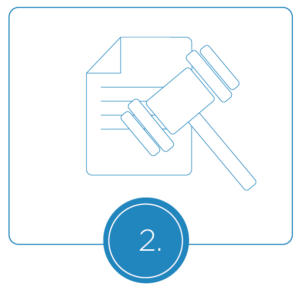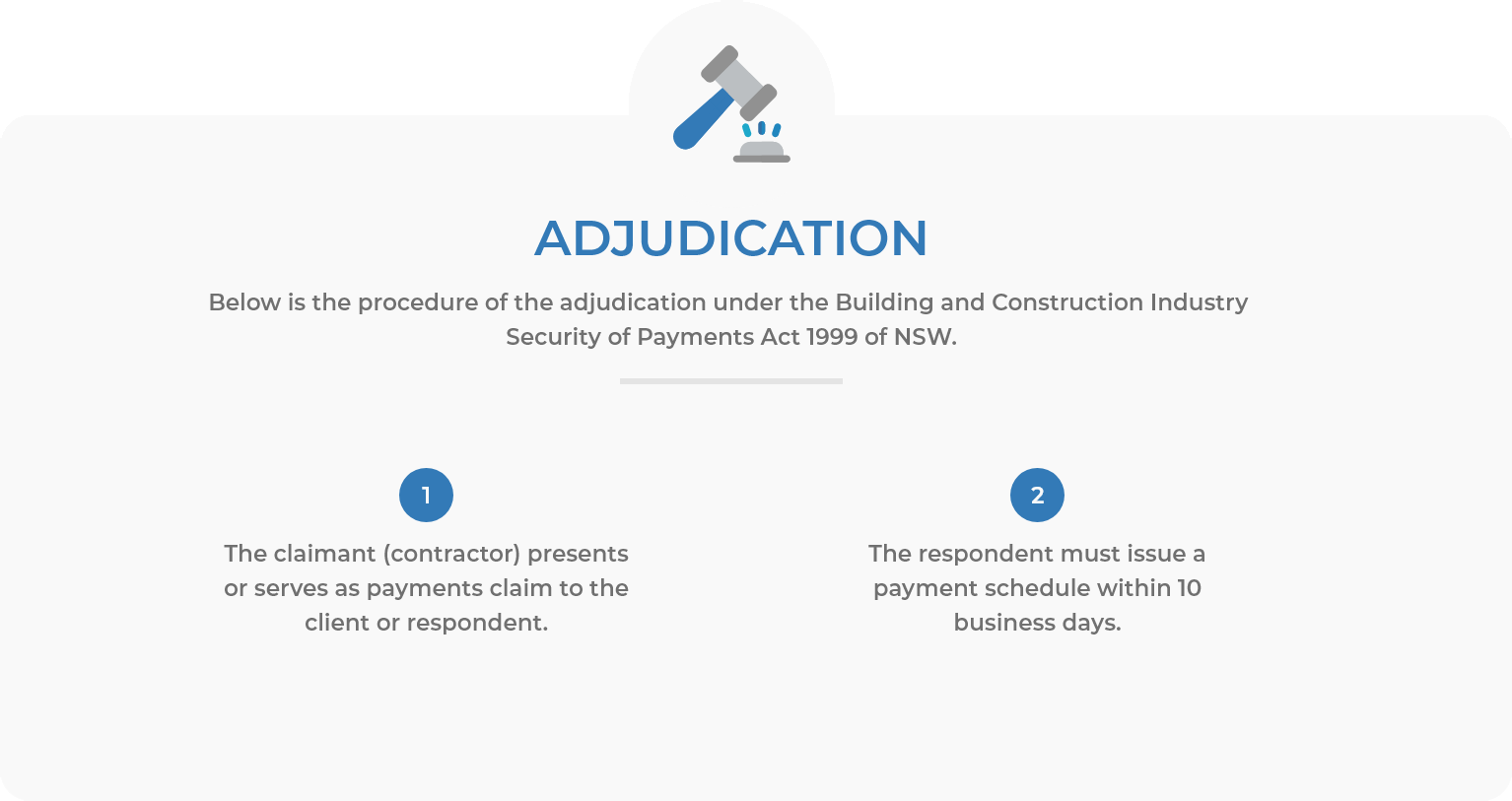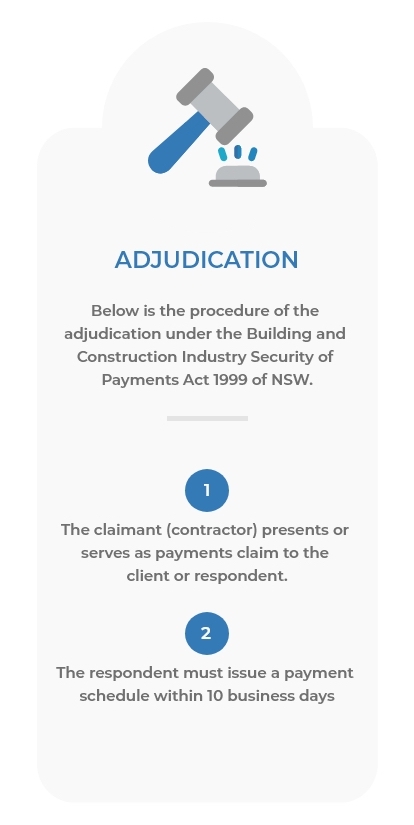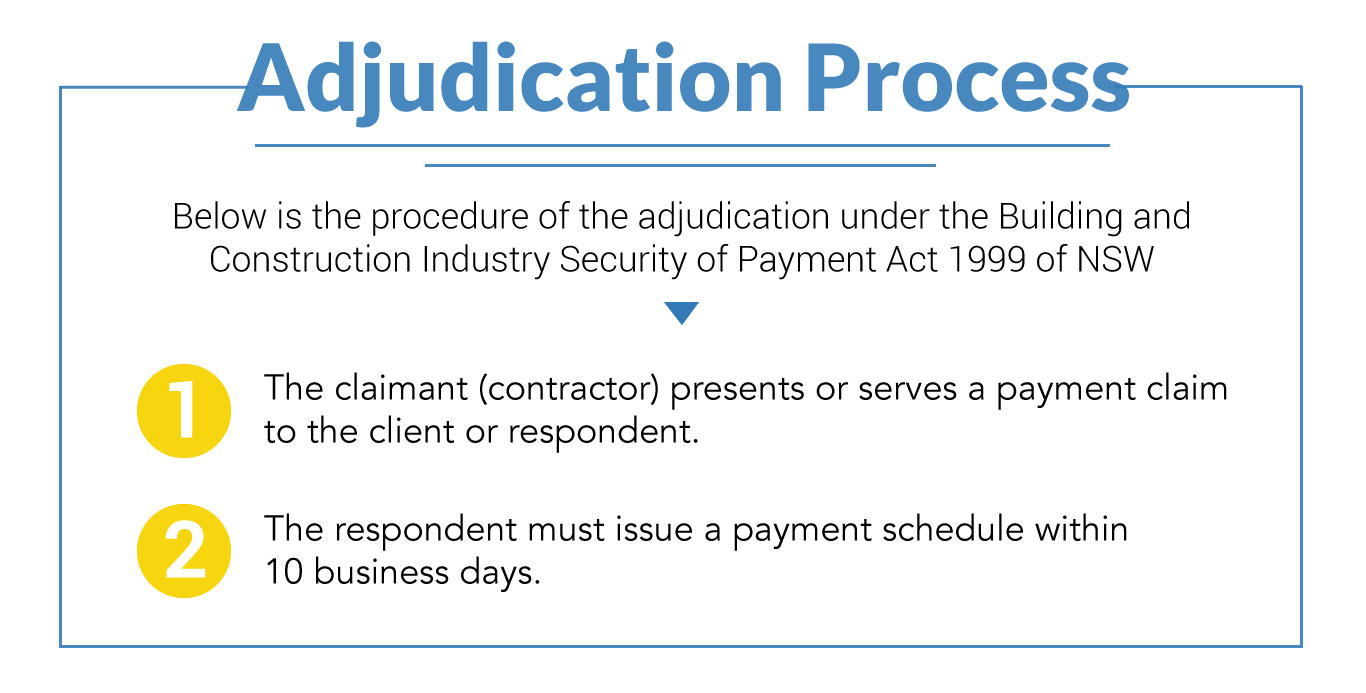NSW 2009, Australia
100 Harris St, Pyrmont
24/7 Customer Support
Mon - Fri: 8:00 - 18:00
You can contact us during the above work hours.
Construction Lawyer & Building Solicitors Sydney | Contracts Specialist Law Firm
100 Harris St, Pyrmont
24/7 Customer Support
You can contact us during the above work hours.
The Adjudication Process is a procedure for resolving payment disputes without the need for a lengthy and expensive court procedure. Adjudication provides numerous benefits compared to court proceedings. For one, it is a more efficient process that can be completed in a matter of weeks. It is also a less costly process than going to court.
In Adjudication, the disputing parties appoint an Adjudicator who has expertise in the relevant field. The Adjudicator reviews the evidence submitted by both parties and makes a decision within strict timeframes. The decision of the Adjudicator is final and binding, but the parties may seek relief from the courts if they believe that the Adjudicator’s decision was not reached in accordance with the process.
It is important to understand that Adjudication is not a court process, but a dispute resolution process. This means that Adjudication does not involve the usual formalities of court proceedings, such as cross-examination, discovery and a formal hearing. Instead, the Adjudicator reviews the evidence submitted by both parties and makes a decision based on the information provided.
The Security of Payment Act is a legislation that sets out strict timeframes for payment and provides a mechanism for enforcing payment disputes. Contractors who have not been paid or who have been paid less than what they are owed can use the adjudication process to seek payment. The process is a quick and inexpensive alternative to traditional court proceedings, making it an attractive option for contractors who need to resolve payment disputes. Overall, the Security of Payment Act provides a valuable framework for ensuring that contractors are paid fairly and on time.
In order to file for adjudication, the contractor must be eligible to do so. Generally, any party who has a payment dispute under a construction contract is eligible to file for adjudication.
This includes contractors, subcontractors, and suppliers.
There are certain circumstances in which a contractor may file for adjudication. This includes if the amount given by the client is less than what is being claimed by the contractor, if the client did not pay any of the disputed amount, or if the client failed to provide a payment schedule. It’s important to note that the Security of Payment Act provides a mechanism for resolving payment disputes, and adjudication is just one of the options available to parties who are seeking to resolve a payment dispute under a construction contract.
The order of escalating dispute typically starts with negotiations between the parties involved. If negotiations fail, Adjudication is the next step in resolving the payment dispute.
Adjudication is a quicker and more cost-effective alternative to court proceedings. It is important to consider these dispute resolution methods before resorting to court, which can be a more costly and time-consuming process.
The Security of Payment Act supports these alternative methods of dispute resolution and encourages parties to resolve disputes through negotiations and Adjudication where possible. By doing so, it promotes a fair and efficient process for both parties involved.






The NSW Building and Construction Industry Security of Payment Act 1999 imposes strict timeframes on Adjudication applications. It is crucial to adhere to these timeframes to ensure the validity of the application and avoid losing the opportunity to resolve the dispute through Adjudication. The parties must also respond within the prescribed timeframes to avoid further delays and potential legal consequences.
The Adjudication process is a speedy and efficient method of resolving payment disputes in the construction industry. The process involves a neutral third party, known as an Adjudicator, who considers the evidence presented by the parties involved and makes a determination as to the amount owed.
To file for Adjudication, the claimant must prepare and serve an Adjudication application on the respondent. The respondent then has a short period to prepare and serve a response. The Adjudicator is then appointed, and the process moves quickly to a determination, usually within 28 days of the Adjudicator’s appointment.
After the Adjudicator makes a determination, the respondent has a short period to comply with the decision, or the claimant may take further steps to enforce the determination. If the respondent does not comply with the determination, the claimant may file the determination as a judgment debt and enforce it through the courts.
It is important to note that Adjudication decisions are binding and enforceable, and there is limited scope for review or appeal. Therefore, it is essential to ensure that all evidence is presented clearly and concisely in the Adjudication application.



Adjudication provides a quicker and more cost-effective resolution to payment disputes than going to court, making it an attractive option for those seeking to resolve payment schedule disputes.
Adjudication is an efficient and cost-effective process for resolving payment disputes in the construction industry.
If you’re facing payment issues, seek legal advice from a specialist construction lawyer and consider undergoing Adjudication.
Contact us today to learn more about Adjudication and how we can assist you.
Contracts Specialist is a Sydney-based construction law firm that deals with Building Disputes, Construction Contracts, Debt Recovery, and Security of Payment. With Contracts Specialist, you are ensured that you are in good hands.
If you’re a homeowner in New South Wales, it’s crucial to understand Construction Law to protect your investment. This ultimate guide to Construction Law is specifically designed to provide homeowners with essential insights into the legal landscape of home building in NSW.
If you’re a homeowner in New South Wales, it’s crucial to understand Construction Law to protect your investment. This ultimate guide to Construction Law is specifically designed to provide homeowners with essential insights into the legal landscape of home building in NSW.